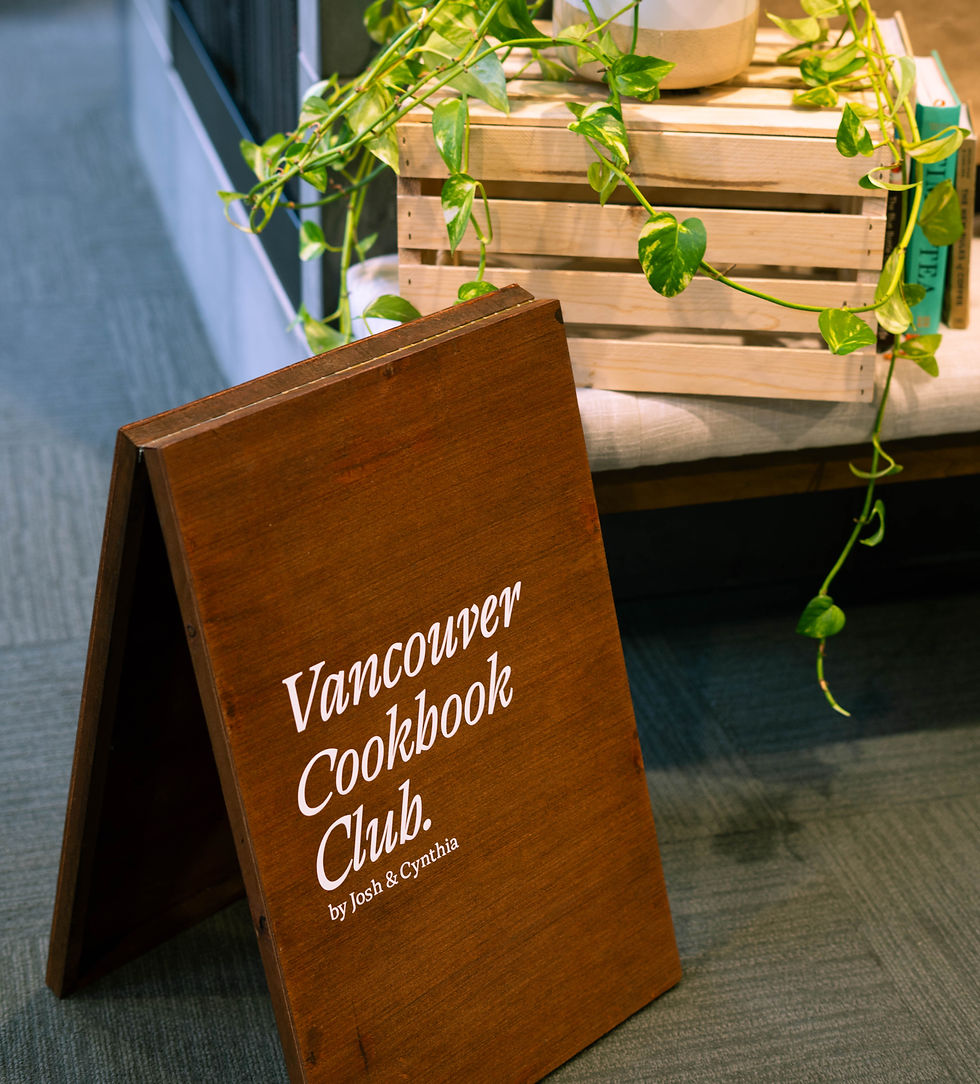How to Start a Cookbook Club
- Josh Mendoza

- Apr 23, 2025
- 3 min read
Updated: Apr 28, 2025

You love food. You enjoy meeting new people and building community. You get excited about trying new recipes and picking up the hottest new cookbook in town. Next thing you know—you’re thinking about starting your very own cookbook club.
Well, you’re in the right place.
What is a Cookbook Club?
Think of it like a themed potluck—but the twist is that everyone is cooking recipes from the same cookbook. It can be anything from Gordon Ramsay’s Home Cooking to more niche gems like Justine Doiron’s Justine Cooks. The world is your oyster!

How We Started Ours
Cynthia and I launched our own Vancouver Cookbook Club by inviting about a dozen friends from church—some we knew well, others we invited because we knew they loved food. Not everyone could make it, but nine of us gathered for the first one.
We chose Magnolia Table by Joanna Gaines for its Southern-inspired recipes and variety of courses—perfect for a gathering. We hosted it at our home, added some cozy winter-rustic touches, and Cynthia handwrote each guest’s place card. (If you’re new here, we love to personalize décor and favours because we’re big believers in making everyone feel welcome and seen.)
We shared a meal, broke bread, prayed, and savoured our homemade dishes. Everyone had a blast—and best of all, there were plenty of leftovers to enjoy in the days after! We also created a reel of our experience and shared it on Instagram and TikTok. We didn’t expect it to gain much traction, but within days, people were asking how to join. Although we originally planned to launch our website in the fall, we fast-tracked everything, launched it right away, and added an Interest Form for anyone wanting to join our Vancouver Cookbook Club.
Since that first event in January, we’ve hosted monthly gatherings—and now, four months in, we’re finally sharing some of our tips for starting your own cookbook club!

Tips for Starting a Cookbook Club
Start Small
Your first event doesn’t need 900 guests! It’s better to start small and do it well than to invite too many and end up overwhelmed. Begin by inviting a few close friends, and encourage them to invite someone they know who’s also into food. This way, you’ll have a general idea of the group dynamic, creating a more relaxed and enjoyable atmosphere.
Take Precautions
We hosted our first club at home, which made for a warm and intimate vibe. However, if you’re opening your club to the public or to people you don’t know personally, it’s important to set boundaries. That’s why we created an Interest Form—so we’d have an idea of who was coming rather than inviting blindly.
Cookbook clubs naturally attract people who are passionate about food and community, but it’s still wise to be cautious. If you’re not comfortable hosting strangers at home, consider using a third-party venue like a café, community centre, or even a local park.
Prioritize People’s Experiences (Food Comes Second)
This might surprise you, but we focus more on creating a meaningful experience than just on the food itself. Sure, it’s a cookbook club, but we’ve found the reason people keep coming back is because of how they feel at our events.
For example, every guest gets a handwritten name tag, food label, or icebreaker favour from Cynthia’s beautiful penmanship. This communicates two things: first, that someone took the time to prepare something just for them—which makes people feel seen and special. Second, it helps us track attendance so we can check in and follow up with anyone who couldn’t make it. People remember being cared for more than they remember how dry the lemon loaf might’ve been.
Oh, and don’t forget to have takeout containers handy! Leftovers are a given—and it’s a thoughtful touch to let your guests bring some home.
Ask for Volunteers
As your club grows, don’t be afraid to ask friends to help out. Whether it’s with cooking, decorating, setting up or cleaning up, an extra set of hands makes a big difference. That way, you can focus on creating a welcoming environment instead of running around stressed.
Have Fun
Last but not least—have fun! Hosting a cookbook club and building a community can be a lot of work, but it’s incredibly rewarding. To keep things fresh, try switching up the venue, introducing themed décor, or exploring a range of cookbooks.

It’s YOUR cookbook club—so make sure you enjoy every part of it. If you just started your own cookbook club, let us know how it went in the comments below, and if you're interested in joining our Vancouver Cookbook Club, make sure to sign up in our Interest Form!















Comments